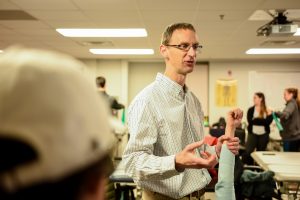Michael Lewek Research
Michael Lewek, PT, PhD, conducts his research in the Interdisciplinary Human Movement Science Lab. He is currently working on several different projects to improve mobility through restoration of walking ability for those with neurological disorders.
 Michael Lewek, PT, PhD
Michael Lewek, PT, PhDOne of Lewek’s studies examines the propulsive forces that are transmitted when walking. While walking, a person’s feet exert force onto the floor, which pushes the person forward if the force is aligned in the correct direction. Lewek’s studies have linked this propulsive force to oxygen use in the body. For those who have had a stroke, the weaker leg exhibits less force to move the body forward. Thus, more oxygen is required, as one side of the body reduces propulsive force after a stroke. This limits the amount that this person can walk, due to increasing fatigue. Ultimately, Lewek’s work has identified that individuals who have had a stroke have a substantial reserve of propulsive force while walking. His current research examines new methods of utilizing this reserve.
Lewek also studies the trips and falls that can occur while walking. People with neurologic injuries or disorders may limit their walking because they are afraid of tripping and falling. His research seeks to characterize naturally occurring trips, so that they may be identified before they occur. If these trips could be predicted, the trajectory of a person’s leg could be altered to keep that person from ever tripping.

As an adjunct faculty member in the UNC/NCSU Joint Department of Biomedical Engineering, Lewek has several active collaborations with faculty in BME. In one collaboration, their team is working to provide ankle joint assistance for individuals following a stroke via an exoskeleton controller. The project seeks to use this device to improve walking speed, metabolic efficiency, and muscle function. Additionally, Lewek works with a team to investigate the impact of control errors that may occur in advanced motorized prosthetics for individuals with transfemoral amputation.
Finally, Lewek is expanding his research to involve Parkinson’s disease, a degenerative disease that can deteriorate a person’s ability to walk over time. It typically causes short shuffling steps when a person walks. Therefore, to improve walking ability, Lewek’s project uses auditory cues as a form of feedback for people as they are walking. This way, subjects can appropriately time their steps to practice more efficient walking. The project’s ultimate goal is to improve the way that people are walking in the real world to positively affect activities of daily living.